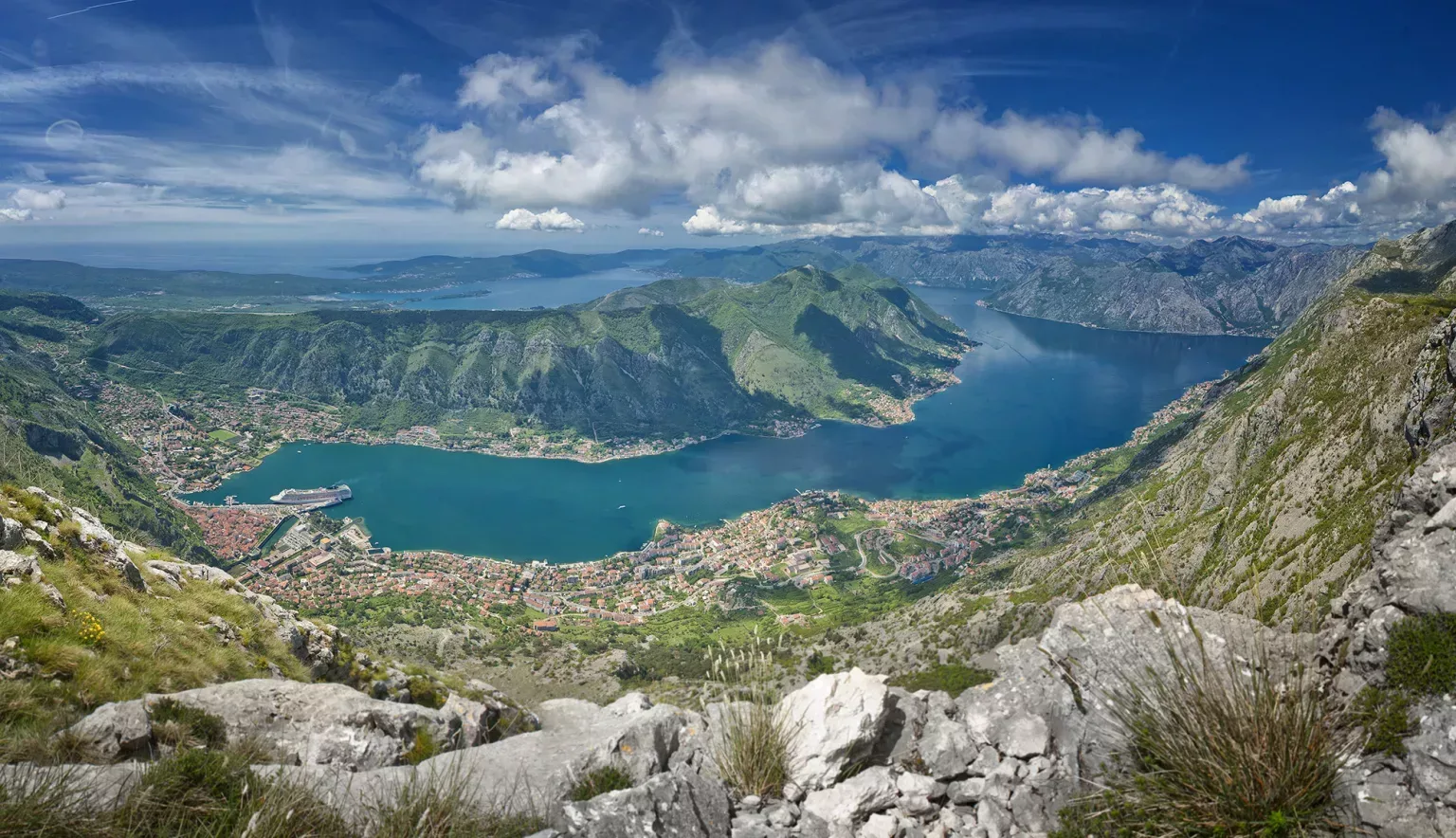Thanks to its shimmering coastline, craggy mountains and timeworn towns, Montenegro is rapidly emerging as Europe’s new ‘it’ destination.
MONTENEGRO
When you travel to Montenegro, you’ll wonder why you left it so long. Lord Byron said of the coastline that it was the planet’s “most beautiful encounter between land and sea”. Sheer stone mountains plunge down to crystalline waters. The coastline is speckled with sandy beaches, while ancient walled towns hug craggy coasts – the Bay of Kotor is particularly eye catching. Watersports such as kayaking, sailing and stand-up-paddleboarding are particularly popular. And unlike other stretches of the Mediterranean, in many places it remains remarkably underdeveloped.
Inland you’ll discover deep canyons, primeval forests and dizzying mountain heights. It’s easy to get off the beaten track in one of Montenegro’s nature reserves, whether you prefer hiking, biking or horse riding. Tara Canyon is the country’s top destination for white water rafting.
Alongside its nature offering, Montenegro is steeped in a fascinating cultural heritage. It stands at a crossroads between east and west, having been ruled by the Romans, Ottomans, Venetians and once forming part of the Soviet Union. Explore Roman villas with airy courtyards and mosaic floors, Orthodox monasteries with gilded interiors, minareted mosques and austere fortresses. This influence is apparent in the picturesque, pastel-hued coastal towns.
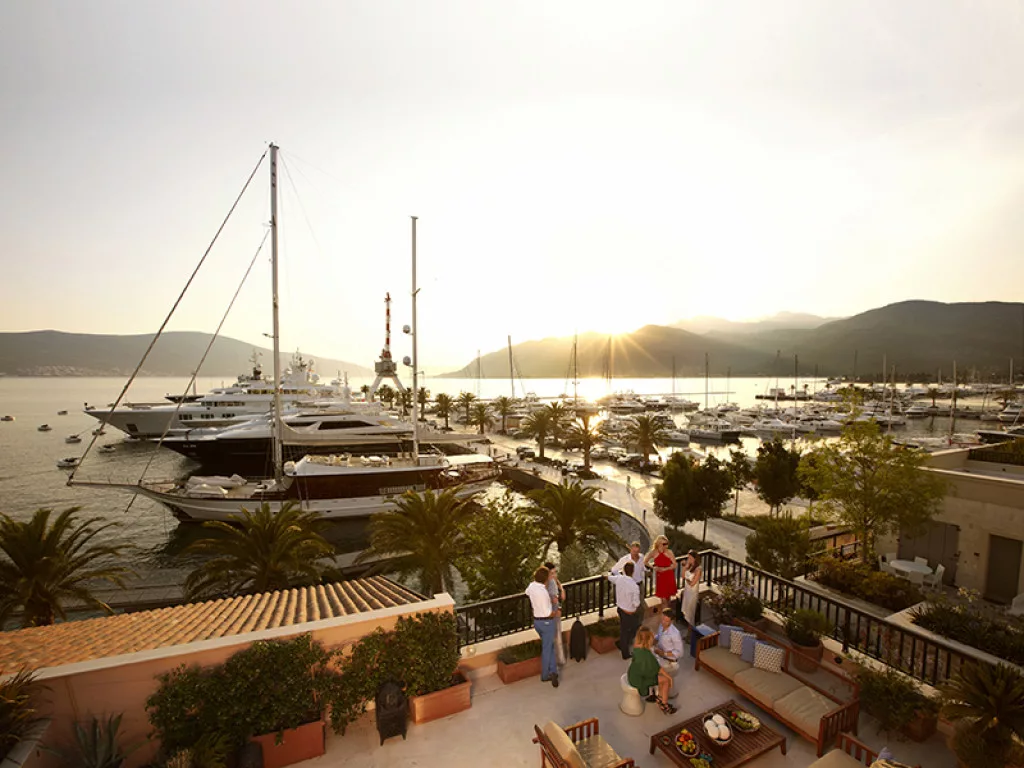
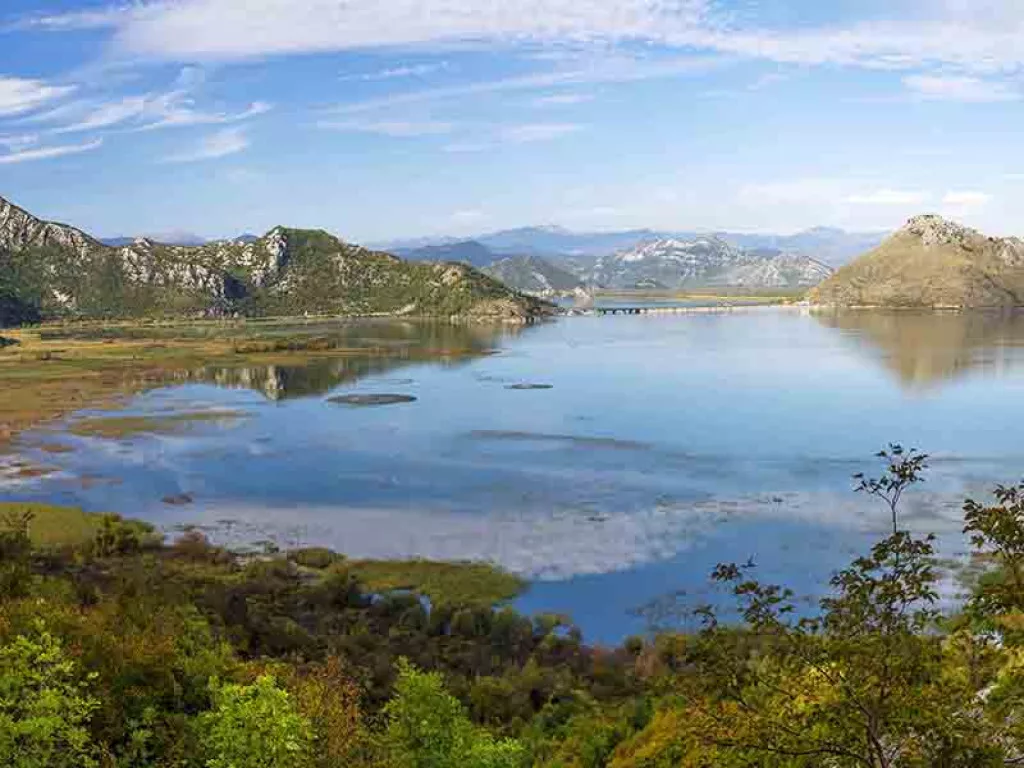
TOURISM INSIGHTS: TOURIST ORGANISATION OF PODGORICA
The Tourist Organisation of Podgorica was established in 2005, following the realisation of public interest in tourism. Its goal: to develop and promote tourism offerings in the city of Podgorica and its surroundings, which include the nearby Lake Skadar National Park and the picturesque Morača River Canyon.
Outlook Travel sat down with Tatjana Popovic, Director of the Tourist Organisation of Podgorica, to find out more about its vision.
Q&A WITH TATJANA POPOVIC, DIRECTOR, TOURIST ORGANISATION OF PODGORICA
What are your organisation’s current goals? Have you got any projects in the pipeline you wish to highlight?
Tatjana Popovic (TP): The Tourism Organisation of Podgorica is working on a tourism development strategy for 2025. According to this strategy, over the next 10 to fifteen years Podgorica will become a recognised tourist destination which offers its cultural, historical and traditional values through high quality, professionally designed products, experiences and activities. Renovating the city centre – equipping the green islands in the city and the area along Morača (and other rivers) – creates zones of experience and attracts residents and visitors.
Podgorica is the youngest capital in Europe, and it has a strategic goal – to become a recognised as a MICE destination in accordance with the masterplan for Montenegro’s tourism development in 2020. The MICE industry is in important contributor to regional and national economies, and Podgorica, right now, is in category M (medium meeting destination), which means that it can host up to 1,200 congresses and meetings.
Why has the amount of visitors to Podgorica increased in recent years?
TP: The increase in overnights and arrivals can be attributed to a variety of factors. In recent years the investments in tourism infrastructure development projects by the government in the capital city has increased. We have new hotels and corporation brands, high quality restaurants which offer not only international, but also our traditional food. We are aware that the hotel industry is one of the most important structural elements of a tourism destination – without these, no destination could be competitive.
The marketing efforts have also been improved by the Tourism Organisation of Podgorica in partnership with the National Tourism Organisation of Montenegro and the private sector.
Another major contributing factor to the increased overnight arrivals is additional airline capacity, with new airlines offering seasonal direct flights.
Finally, there are a large number of festivals and events all year round. Each year Podgorica hosts hundreds of business tourism events ranging from small meetings, corporate events and incentive groups to large international association conferences.
Why, in your opinion, should someone visit Podgorica?
TP: Podgorica has diverse attractions, a rich culture and natural attractions with a segmented tourist offer. Thanks to its extraordinary central position in the country, on the same day it is possible to visit the seaside in the south or mountains in the north, as well as Lake Skadar and the “circuit around Korita” – Montenegro’s first panoramic road. Just four kilometres from the city centre is the archaeological site Doclea, which is the biggest Roman site in the Balkans, and known as “Montenegrin Pompeii”.
The region is also well known for having the biggest vineyard in one complex in Europe, Ćemovsko Polje, and a gorgeous wine cellar Šipčanik, owned by Plantaže.
Podgorica has a strong luxury offering, with high standards of accommodation, restaurants, events and high-end shops.
The city of is waiting to welcome tourists who want to discover gorgeous landscapes and rich cultural heritage, to taste divine local products and wine, and to enjoy wonderful moments in this hospitable and safe country.
Are you optimistic about the future of the tourism industry in Podgorica?
TP: Yes, we are. Podgorica has a strategy for development as a smart city, which will help us to use modern technology for tourism promotion and offers. We will continue to improve the tourism offering in Podgorica using creative and innovative solutions.
Depending on the characteristics of the global tourism industry, our goal is to maintain the continuity of increasing the number of tourist arrivals and overnights, and to strengthen the image of Podgorica as an attractive MICE destination.
What we definitely need is to involve all segments in the tourism sector, and in synergy with them create new innovative tourism products with a focus on active holidays and local culture (including authentic products and hospitality). We also need to continue strengthening our promotion through digital communication channels.
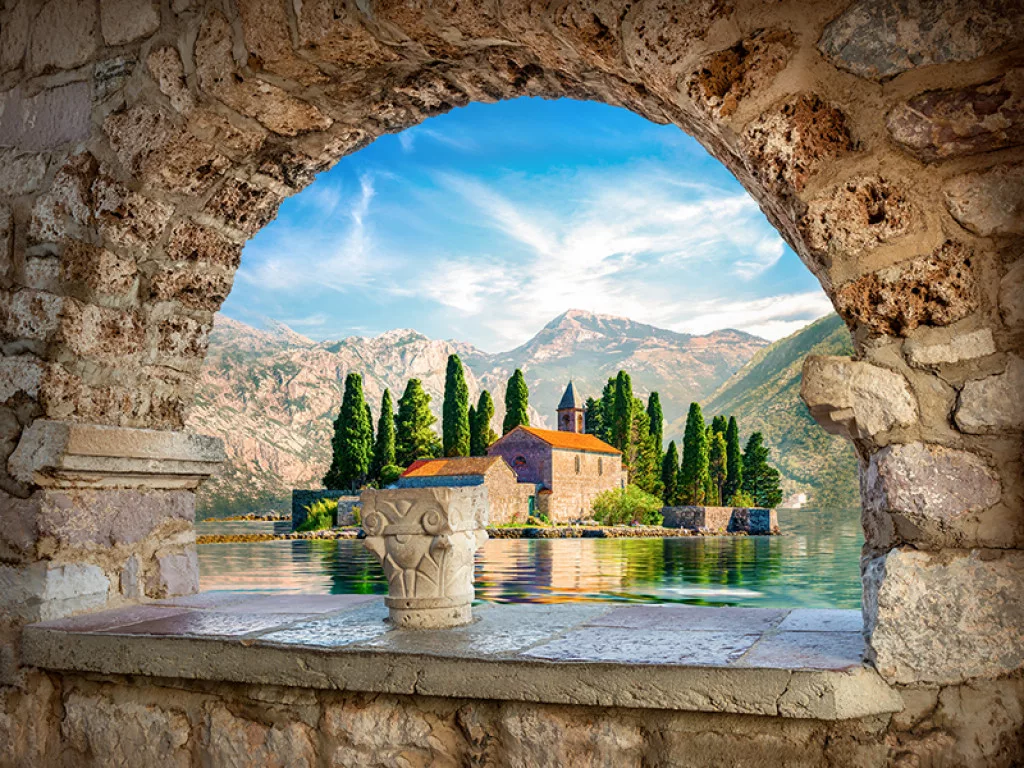
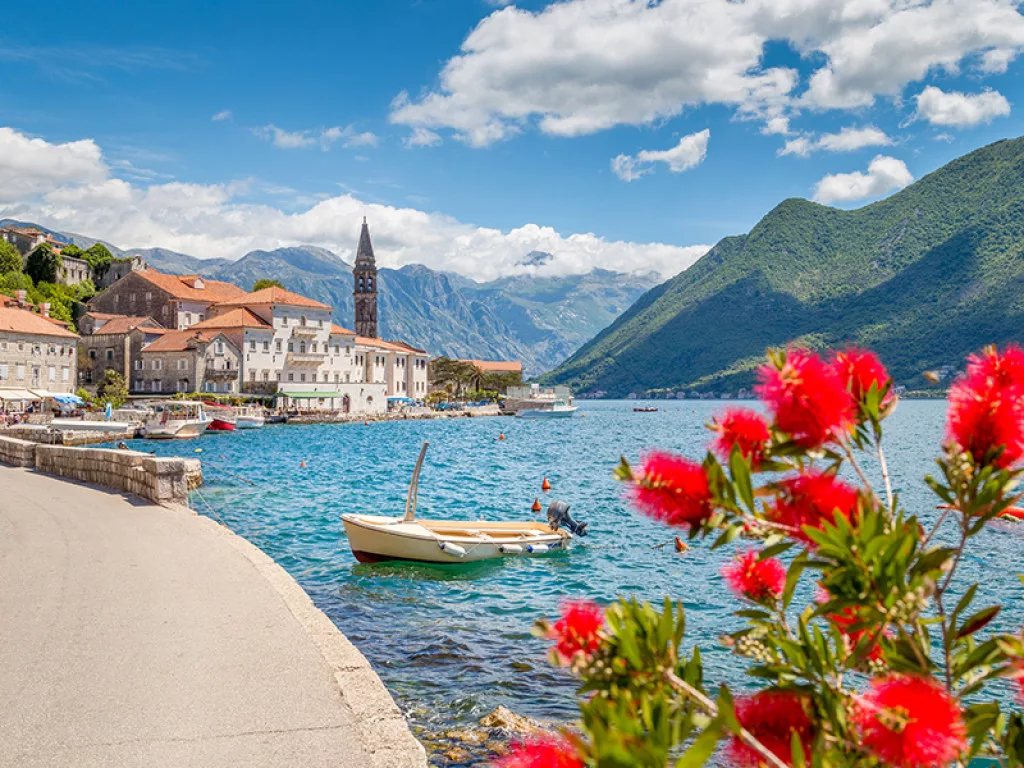
HOW TO SPEND 72 HOURS IN MONTENEGRO
Montenegro Travel’s perfect three day itinerary, taking in everything from pristine beaches to UNESCO-designated historic towns
Changeable landscapes and fantastic diversity in a relatively small geographic area mean there’s lots to see and do in Montenegro. Experience the country’s wild beauty with this varied three day itinerary.
DAY ONE
Tivat – Kotor – Cetinje – Budva (83 kilometres)
Rent a car from Tivat Airport and drive to Tivat. Stroll down the Pine Promenade, along the water’s edge. Have breakfast at one of the luxury restaurants in the most beautiful marina in the Adriatic – Porto Montenegro – and marvel at the magnificent private yachts.
Continue your trip towards the Old Town of Kotor, located 10 kilometres away from Tivat. Stroll the narrow, UNESCO-protected streets, past ancient piazzas, churches and museums. You can walk along the iconic city walls for an unforgettable view.
From Kotor, head towards Cetinje. The road connecting them was built in 1884; it has 25 serpentine bends and offers a breathtaking view of the Bay of Kotor.
You will arrive in the mountain village of Njegusi, the birthplace of the most important person in Montenegrin history – the ruler and Prince-Bishop of Montenegro, Petar II Petrovic Njegos. Visit a 100-year-old family restaurant, Kod Pera na Bukovicu, and taste its Njegusi prosciutto and homemade mead. Climb Mount Lovcen to the Njegos Museum, located at an altitude of 1,660 metres.
Continue your journey towards Cetinje, the capital of Montenegrin spirituality; a city of museums, monasteries, old embassies and consulates, and home to the Royal Castle.
Taking the new road, you can reach Budva from Cetinje in 35 minutes. Apart from its beautiful beaches, Budva is famous for its excellent restaurants and offering the best entertainment in the Adriatic.
DAY TWO
Budva – Bar – Ulcinj – Ostros – Podgorica (165 kilometres)
After you have your first morning coffee on the seafront in Budva, head towards the unique island hotel, Sveti Stefan. When you see this place – which has accommodated world-famous celebrities such as Sophia Loren – you will understand why the rich and famous decide to come here.
Your trip continues towards Bar, the largest coastal town and port in Montenegro. After exploring the oceanfront, head to the Old Town – it preserves the spirit of old Turkish towns with its stone cobbles, many traditional and authentic restaurants, and the oldest olive tree in Europe.
Continue your journey south towards Ulcinj, the city of long sandy beaches. Go down to the Town Beach, located next to the Old Town. Take a walk around the Old Town and listen to the guide’s story about the pirates and Cervantes, a prisoner of the dungeon you are looking at.
Continue towards Ada Bojana, the place where the River Bojana meets the sea. Visit one of the restaurants located along the river. If it is summer, take a swim and enjoy drying off on the warm sand.
Drive along the shore of Lake Skadar, the largest lake in the Balkans and, when you descend to lake level, visit the scenic little town of Virpazar. Enjoy a glass of local wine in a riverfront tavern, or try some local cuisine – specialities include smoked, marinated or “drunk” carp, and fish soup.
You will be in Podgorica by the evening. Get acquainted with the capital by taking a walk through the centre. Cross the River Moraca by one of the pedestrian bridges, and relax in one of the fine restaurants or pubs, which can be found on every corner.
DAY THREE
Podgorica – Biogradska Gora – Durmitor – Niksic – Podgorica (289 kilometres)
Start early, at least at 7:30, as you have a long tour ahead of you. You are about to experience an incredible adventure.
From Podgorica, head towards Kolasin. The mountains are waiting for you.
Going through the dramatic canyon of the River Moraca, the view on your right hand side of the rocky canyon and the roaring river will give you an adrenaline rush. Stop for a walk at the mountain town of Kolasin – enjoy a local tea in the comfortable foyer of the Hotel Bianca Resort & SPA.
Further on your road leads you towards Biogradska Gora, one of the last three virgin forests in Europe, and a nature reserve since 1878. In the very heart of the virgin forest, at an altitude of 1,094 metres, Lake Biogradsko is hidden.
From Biogradska Gora, your journey continues towards Durmitor. Pass the black pine forest, Crna, and Djurdjevica Tara Bridge, which rises 150 metres above the deep canyon. If you are brave enough, you can zipline across the River Tara – an adrenaline rush for even the most intrepid traveller.
Continue upwards towards Zabljak, the most popular town in Durmitor National Park. The town is small, which makes it easy to for you to find your way around it.
Take a walk along the path leading to the Black Lake. If you plan a longer stay, you can hike to one of Mount Durmitor’s peaks, such as popular Bobotov Kuk, 2,523 metres above sea level. Get more information about skiing and hiking in the region by visiting the Tourism Organization of Zabljak, in the town centre.
You will reach Podgorica from Zabljak in around two hours. Stop off in Niksic for a meal in a restaurant on the shore of Lake Krupac.
You’ll see so many amazing sights over these action-packed three days, and there’s still so much left to experience. We guarantee that you’ll want to return to Montenegro again soon.
PODGORICA IN FOCUS
Podgorica, Montenegro’s capital, is located in the south of the country, a mere 30 kilometres from the Albanian border. It’s not a city renowned for its architecture or atmosphere. Streets are lined with brutalist tower blocks and new mall developments. But scratch beneath the surface and you’ll discover a buzzing nightlife, interesting art galleries and a rich culinary and cultural history.
Stara Varos, the city’s old town, was built by Ottoman Turks and still maintains traces of its architecture. The recently restored Osmanagić Mosque is one of the area’s most picturesque buildings. Petrović Palace – the former home of Montenegro’s ruling family – is also worth a trip. The pink mansion is set within landscaped gardens and houses an art gallery showcasing art from Yugoslavia and beyond. Head down to the Ribnica River to check out the remains of a fifth century Roman settlement, with a bridge renovated under Ottoman rule.
A popular outing is to Plantaze’s Cemovsko Polije Vineyard (Montenegro’s largest wine producer). Visitors can tour the vineyard on a miniature train and taste wines with local canapes of marinated carp and prosciutto from Njegusi village.
The city is also an ideal base to explore Montenegro, with plenty of stunning natural scenery within easy reach. The dreamy Lake Skadar is just a 20-minute drive away. This vast body of water is surrounded by forested hills, the shores dotted with quiet beaches and timeworn villages. As a protected area, it’s one of Europe’s top habitats for birds.
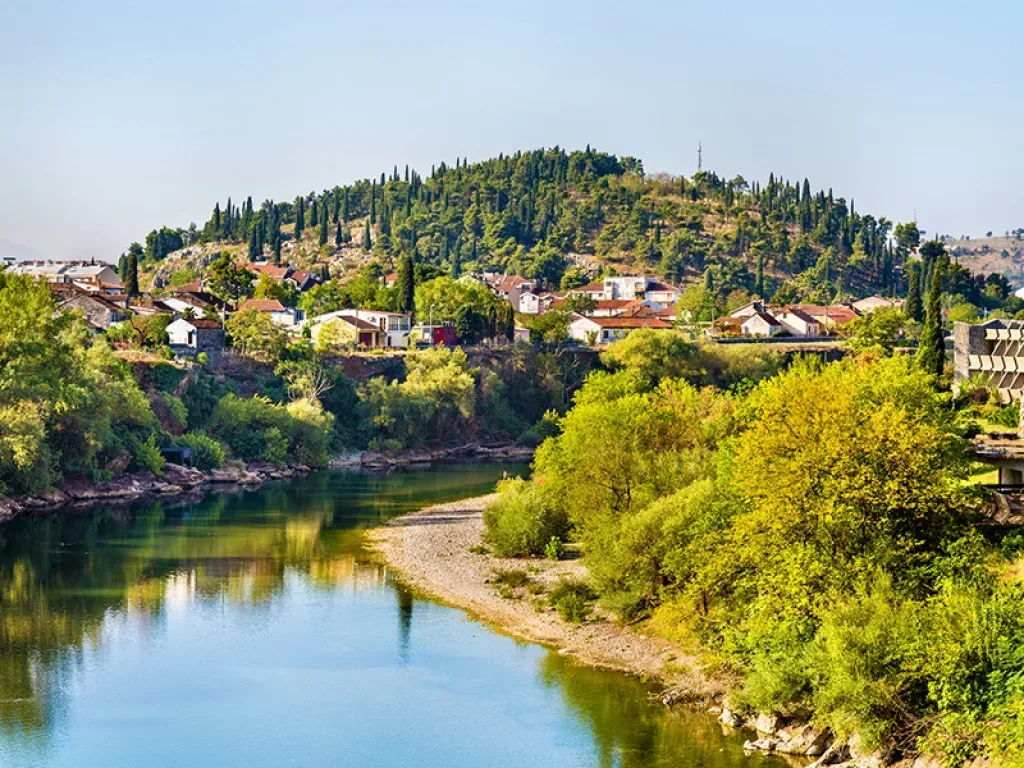
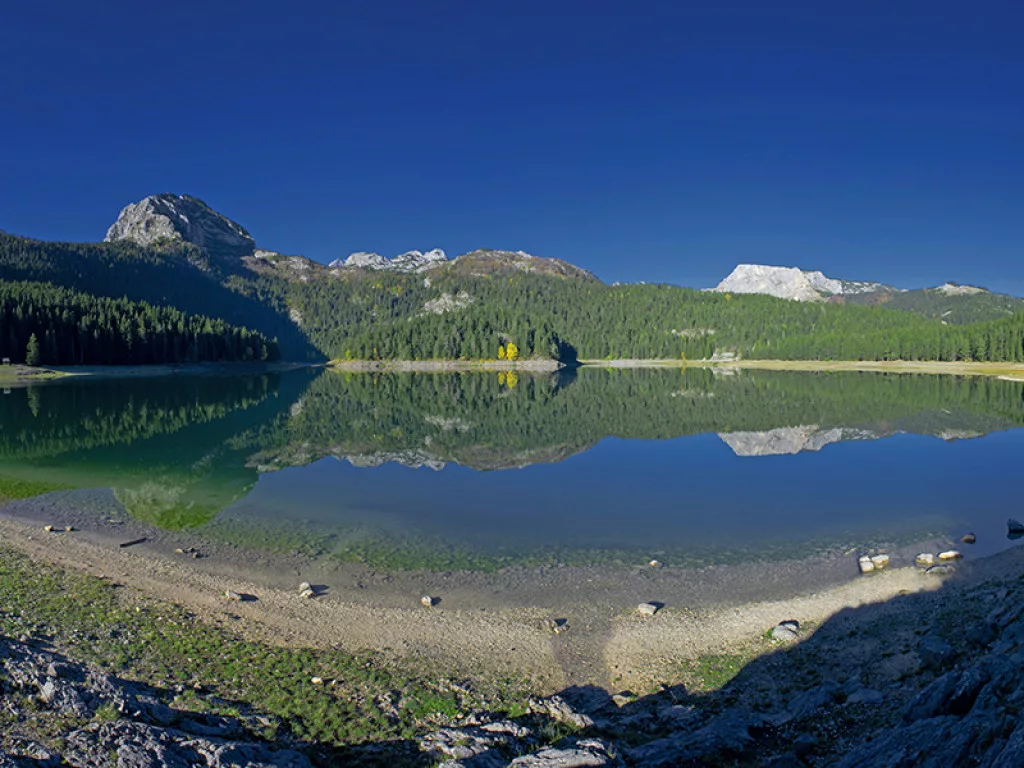
OUTLOOK RECOMMENDS
Eat:
For Montenegrin cuisine and fresh seafood…
For Kotor’s best seafood dishes…
Sleep:
For an adults-only getaway in Budva…
Falkensteiner Hotel Montenegro
For luxury villas on the Budva Riviera…
Ananti Resort, Residences & Beach Club
Do:
For action-packed excursions in Durmitor National Park…
For boat tours of Lake Skadar…
LANDMARK ATTRACTIONS
Bay of Kotor
Peacock-blue waters are encircled by mountains in this breathtaking bay, known locally as ‘Boka’. Gorgeous medieval towns are dotted around its edge, along with idyllic beaches, making it a great spot for swimming and sightseeing.
Stari Grad
One of Budva’s top attractions is it’s Stari Grad (Old Town), one of the oldest cities on the Adriatic Coast. It’s a picturesque city of marble streets and venetian mansions, which has been rebuilt after being damaged by two earthquakes in 1979 – head to Citadela for spectacular sea views.
Ostrog Monastery
This brilliant white monastery has been hewn into a cliff-face 900 metres up. It is one of the most important Orthodox Christian sites in the Balkans, attracting almost a million pilgrims annually.
St George island
This small island is located in the Bay of Kotor, near the town of Perast. It’s dominated by a 17th century church, built on the remains of a 9th century benedictine monastery. The island is shrouded in myths – it was supposedly cursed by the Roman Pope after an atrocious crime was committed on its shores.
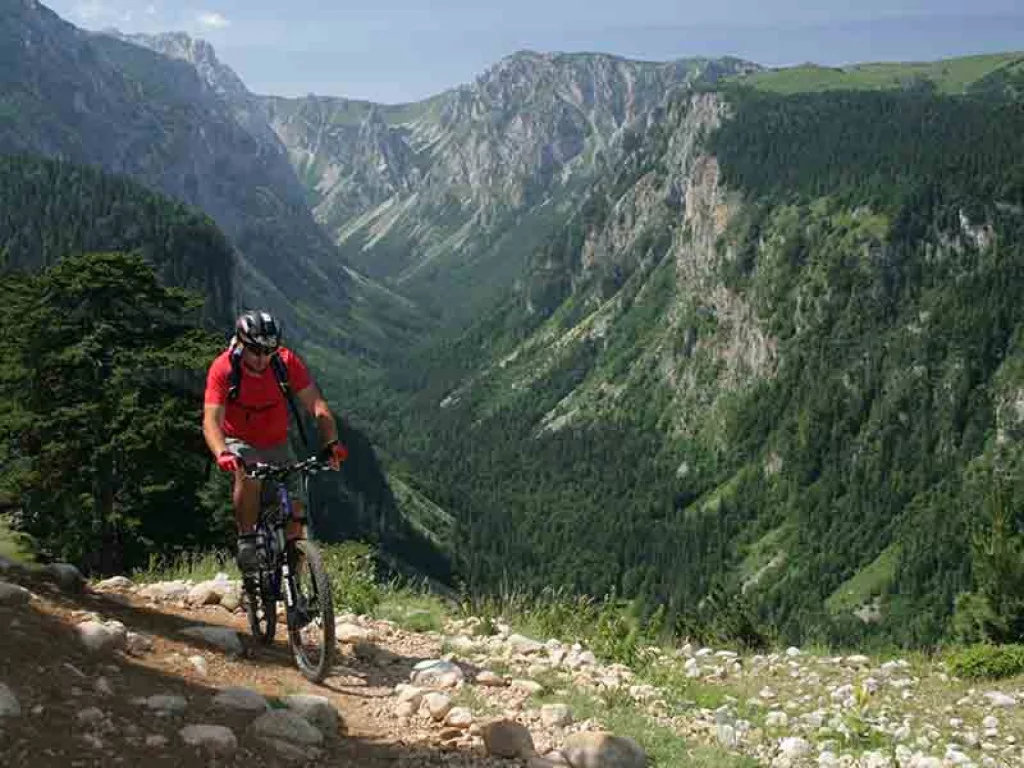
GETTING THERE AND AROUND
Tivat Airport is the main international gateway into the country. It flies to 31 destinations in 17 different countries, all of which are based in Europe. Travellers from outside Europe will have to travel via other high-traffic airports such as Istanbul, Amsterdam or Frankfurt. Another option is to fly into busier Dubrovnik Airport, located a mere 20-minute drive from the Croatia-Montenegro border (and around an hour from the Bay of Kotor).
There are no domestic flights available within the country, but it’s only a three-hour drive from one side of the country to the other. Montenegro has an efficient bus network connecting all major destinations. However, renting a car is a more popular option with tourists – there are some breath-taking drives.
Most towns in Montenegro are compact enough to be explored on foot. Greater Podoriga has an inexpensive local bus network. Private taxis are also available to hire in most towns.


